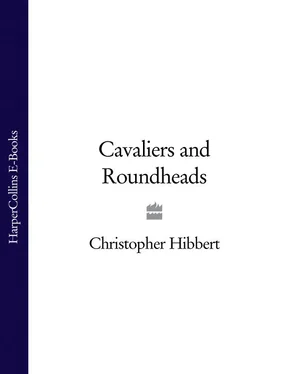Christopher Hibbert - Cavaliers and Roundheads
Здесь есть возможность читать онлайн «Christopher Hibbert - Cavaliers and Roundheads» — ознакомительный отрывок электронной книги совершенно бесплатно, а после прочтения отрывка купить полную версию. В некоторых случаях можно слушать аудио, скачать через торрент в формате fb2 и присутствует краткое содержание. Жанр: unrecognised, на английском языке. Описание произведения, (предисловие) а так же отзывы посетителей доступны на портале библиотеки ЛибКат.
- Название:Cavaliers and Roundheads
- Автор:
- Жанр:
- Год:неизвестен
- ISBN:нет данных
- Рейтинг книги:5 / 5. Голосов: 1
-
Избранное:Добавить в избранное
- Отзывы:
-
Ваша оценка:
- 100
- 1
- 2
- 3
- 4
- 5
Cavaliers and Roundheads: краткое содержание, описание и аннотация
Предлагаем к чтению аннотацию, описание, краткое содержание или предисловие (зависит от того, что написал сам автор книги «Cavaliers and Roundheads»). Если вы не нашли необходимую информацию о книге — напишите в комментариях, мы постараемся отыскать её.
Cavaliers and Roundheads — читать онлайн ознакомительный отрывок
Ниже представлен текст книги, разбитый по страницам. Система сохранения места последней прочитанной страницы, позволяет с удобством читать онлайн бесплатно книгу «Cavaliers and Roundheads», без необходимости каждый раз заново искать на чём Вы остановились. Поставьте закладку, и сможете в любой момент перейти на страницу, на которой закончили чтение.
Интервал:
Закладка:
His son had been brought up in the belief, as propounded in a little manual, Basilikon Doron, which King James had written for him, that kings, like fathers, derived their authority from God and from Him also derived their right to demand obedience and honour. A few months before his accession Charles had heard his father tell Parliament – and he himself clung resolutely to the belief throughout his life – that the King of England sat on Jesus’s throne on ‘this part of the earth’.
But Charles was neither so shrewd as his father nor so wary; he did not appreciate just how possessively Parliament regarded its right to approve taxation. He affronted Parliament by virtually ignoring it. Whereas it had been his father’s practice to make long speeches to both Houses, to send them frequent messages, to remind them constantly of his theory of kingship, he himself addressed them in the briefest, curtest way. He left them in no doubt that he regarded it as Parliament’s duty, as it was all his subjects’ duty, to recognize his absolute authority, to trust him to do what was best for them of his own goodwill. Miserable in his marriage to an unhappy and highly-excitable wife, dependent upon the wayward advice of the volatile and forceful Duke of Buckingham, he seemed driven by a nervous insecurity and sense of personal inadequacy to arrogate to himself privileges and rights which his father would never have claimed. ‘This King,’ wrote Lucy Hutchinson, daughter of the Lieutenant of the Tower of London and wife of a Nottinghamshire gentleman, ‘was a most excellent judge and a greate lover of paintings, carvings, gravings and many other ingenuities .…But a worse encroacher upon the civill and spirituall liberties of his people by farre than his father.’ Grave, reserved and fastidious as was his usual demeanour, those close to Charles learned to beware of the sudden outbursts of anger which erupted when he felt his authority or dignity questioned, to dread the obstinacy which was to bring about his downfall.
Moreover, he was wholly lacking in the bonhomie which had attracted men to his great-great-grandmother’s brother, Henry VIII, and which his father had often carried to such excess. For all his gentleness and constancy, the exquisite courtesy of his manner, his innate goodness, he was a man more revered and respected than liked. His constraint and lack of humour were barriers to intimacy that all but a very few found it impossible to cross. His slight stammer, which in another man might have been appealing, was in him merely a defect which made it the more difficult for him to put strangers and Members of Parliament at their ease, seeming to emphasize the atmosphere of melancholy that surrounded him.
This atmosphere was reflected in the normally sad expression of his face, an expression so well conveyed in Van Dyck’s Charles I in Three Positions that when Bernini saw it he described the countenance depicted as ‘doomed’. ‘Never,’ the sculptor said, ‘never have I beheld features more unfortunate.’
Underlying the melancholy there was a certain lack of sympathy in the King’s responses, a defensive rejection of an intimacy that might reveal him as less assured than he tried to be. Few men ever felt that Charles really liked them. Few servants ever felt that their services were truly appreciated; if they did not do their duty they were politely dismissed; if they did do their duty they were merely doing what was expected of them. They were treated well but rarely with a hint of warmth or affection.
Charles was a diligent man rather than an intelligent one; he understood books better than people, though he did learn and gain experience from people: as Philip Warwick, later to be one of his secretaries, said, like King Francis I of France he learned more by ear than by study. Moreover, he seemed incapable of making that sort of contact with his subjects which was to ensure for his eldest son, despite all his manifest faults, a far greater personal popularity and following.
The first Parliament of King Charles’s reign, in 1625, failed to provide him with the financial support he had asked of it, declining to grant him for more than a single year the right to collect those customs duties which his predecessors had been granted for life. Displaying more interest in religion at home than in the King’s differences with dynasties abroad, its members went on to urge stronger measures against Roman Catholicism, fresh support for Puritanism, and the public disgrace of a clergyman who had denied that the Pope was Antichrist. Charles replied by dissolving Parliament and appointing the clergyman one of his own chaplains.
The King’s second Parliament, in 1626, proved no more satisfactory than the first. In order to make it more tractable, he had rendered those Members who had previously proved most tiresome ineligible for election by appointing them sheriffs. This manoeuvre, however, merely resulted in the elevation to the leadership of the Commons of a Member far more dangerous than the relatively moderate men who had been excluded, Sir John Eliot, son of a rich Cornish squire. Emotional and vehement, Eliot harangued the Commons in a loud, harsh voice, protesting that he and his fellow Members were not creatures of the King elected to approve his policies and vote him supplies but men with individual consciences and a duty to act only in accordance with what they knew to be right. He demanded an inquiry into the conduct of his erstwhile friend and patron, the Duke of Buckingham, and went so far as to urge his impeachment.
Charles reacted as though in panic. He had Eliot arrested and imprisoned in the Tower. But when the House, refusing to be intimidated, declined to do any further business until Eliot was released, the King gave way, releasing Eliot, yet at the same time despatching a curt and provocative message to the House enjoining its Members to lose no more time in voting him the money for which he was tired of waiting.
On his return to the Commons, Eliot immediately returned to the attack. In the middle of a violent storm that dashed the rain against the windows of the chamber and hurled the waters of the Thames across the river steps, he demanded that the complaints of the Commons should be heard and registered before financial matters were discussed, at the same time attacking the Duke of Buckingham in the most extravagant terms. Eventually the Duke was impeached by the Commons. The King responded by dissolving Parliament in 1626 before the proceedings against Buckingham had been completed.
Unable now to raise money through the House of Commons, the King was reduced to finding other, more direct means of support. Disregarding Parliament’s refusal to grant him the Crown’s traditional customs duties, he ordered their collection; he imposed a capital levy, had those who refused to pay it imprisoned, and dismissed the Lord Chief Justice for questioning its lawfulness.
The immensely expensive failure of the Duke of Buckingham’s expedition to France in 1627, however, obliged the King to summon Parliament again in the hope that its Members would recognize the common danger. But the danger, as the Commons saw it, came not from the country’s enemies abroad but from what they took to be the tyranny of the King at home. They refused to grant money to him until they had set out their grievances, in particular their condemnation of taxation without Parliamentary consent and imprisonment without due legal process. They incorporated their grievances in a Petition of Right of 1628 which they presented to the King for his assent as though it were a statute. Declining to bestow such authority upon it, the King said that he would be graciously pleased to accord it his ‘royal word’. The Commons, unwilling to trust his word, expressed their dissatisfaction with the formula and returned with renewed vigour to the condemnation of the Duke of Buckingham, whom they saw as the chief source of all their misfortunes. In an attempt to save his dearest friend, Charles gave way and, calling upon the Commons to attend him in the House of Lords, he signified his formal assent to the Petition, adding with petulant self-justification, ‘This I am sure is full, yet no more than I granted you on my first answer. And I assure you that my maxim is that the people’s liberties strengthen the King’s prerogative and that the King’s prerogative is to defend the people’s liberties…I have done my part, wherefore if the Parliament have not a happy conclusion the sin is yours. I am free of it.’
Читать дальшеИнтервал:
Закладка:
Похожие книги на «Cavaliers and Roundheads»
Представляем Вашему вниманию похожие книги на «Cavaliers and Roundheads» списком для выбора. Мы отобрали схожую по названию и смыслу литературу в надежде предоставить читателям больше вариантов отыскать новые, интересные, ещё непрочитанные произведения.
Обсуждение, отзывы о книге «Cavaliers and Roundheads» и просто собственные мнения читателей. Оставьте ваши комментарии, напишите, что Вы думаете о произведении, его смысле или главных героях. Укажите что конкретно понравилось, а что нет, и почему Вы так считаете.










